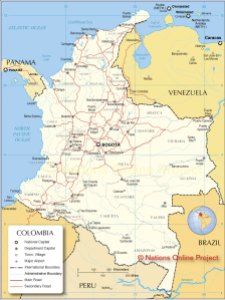For general information about the country profiles click here.
 Population: 47,704,427
Population: 47,704,427
HDI ranking: 91/187
HDI score: 0.719
The decentralization process in Colombia began in the late 1970s. The process took nearly 25 years, significantly longer than neighboring countries, and there are still improvements to be made. The original motive for decentralization was to subdue the nation-wide violence that began in the 1960s.
Local governance at a glance
- The Ministry of the Interior is responsible for overseeing the relationship between the national government and the local government.
- Colombia is divided into:
- 32 departments, led by a Governor and a Department of Assembly, and
- 1,119 municipalities, led by a mayor (alcalde) elected by a popular vote and a municipal council.
Civil society actors include
- Red de ONGs Por la Transparencia (Network of NGOs for Transparency) envisions civil society organization to be as open and transparent as possible, and they strive to make this possible.
- Federación Antioqueña de ONG (The NGO Federation of Antioquila) influence policy changes to benefit social sector organizations.
- Confederación Colombiana de ONG (Colombian Confederation of NGOs) exists to strengthen NGOs building social inclusion, participation, and democratic coexistence.
- The National Democratic Institute (NDI) works in Colombia to promote women’s and Afro-Colombians’ participation in the government.
- Transparency for Colombia (TPC) is the local chapter of Transparency International, working to ensure that finances are clearly accounted for in political campaigns.
Capacity building institutions
- A Javeriana University program promotes local access to government and participation. The University also created a network for departmental and municipal governments to share information and improve overall participation (WMD, 2013).
Fiscal control
- Central government funds make up 40% of the budget transferred to local governments. As part of the constitutional reform, the majority of this money must be spent on health and education (Journal of Development Studies, 2008).
- A 2013 International Center for Public Policy paper found, “[n]ot only have [Colombia’s] public finances generally been managed surprisingly well and responsibly in recent decades, through periods that were difficult both domestically and internationally, but at the same time, Colombia has also become one of the most fiscally decentralized countries in the region” (ICPP, 2013).
Key initiatives for participatory local governance
- In 2007, the country initiated a reform of its fiscal transfer system to increase transfers from the central to local governments.
- 1986, Colombia initiated direct elections of municipality mayors (alcades) (ICPP, 2013). In 1991, the country initiated direct elections of governors (World Bank, 2009).
- The 2012 peace talks between the federal government and the Revolutionary Armed Forces of Colombia (FARC) demonstrate steps toward progress (FCO, 2013).
- In May of 2013, FARC and the Colombian government signed an agreement concerning land issues, furthering the peace process (IDMC, 2013).
- In June 2013, the FARC issued a call for further decentralization to “guarantee and stimulate the participation of regions, territorial entities and territories, and the political, economic, social, cultural and environmental definitions of the State, compensating the excessive centralism” (Colombia Reports, 2013).
Challenges for participatory local governance
- A 2009 report from the World Bank details Colombia’s decentralization efforts and outlines several challenges, including: Uneven performance and capacity of subnational governments, independent of fiscal capacity or income levels; Increasing central government transfers to subnational governments should be coupled with incentives to actually improve service delivery (World Bank, 2009).
Recent posts on this website about this country:
- Annual World bank conference on land and poverty : conference agenda (2011)
- Decentralization against parties? : the effects of decentralization on political parties in Bolivia, Colombia and Peru (2011)
- Participation for what : social change or social control? (2010)
- Innovations in land rights recognition, administration, and governance (2010)
- Water supply reforms and child mortality in Colombia 1990-2004 (2009)
- Of global concern : rural livelihood dynamics and natural resource governance (2006)
- Assessing the merits of decentralization as a conflict mitigation strategy (2006)
- Designing rules for demand-driven rural investment funds : the Latin American experience (1998)
List of sources (in order of citation):
UN Human Development Index, 2012: “Colombia”
Faguet, Jean Paul and Sánchez, Fabio, 2009: “Decentralization and Access to Social Services in Colombia”
World Movement for Democracy (WMD), 2013: “Capacity Building”
Faguet, Jean Paul. Journal of Development Studies, 2008 “Decentralisation’s Effects on Public Investment: Evidence and Policy Lessons from Bolivia and Colombia”
Land Deals Politics Initiative, 2011: “Territory by Dispossession: Decentralization, Statehood, and The Narco Land-Grab In Colombia; Ballvé T”
Colombia Foreign and Commonwealth Office (FCO), 2013
Internal Displacement Monitoring Center (IDMC), 2013
Colombia Reports, 2013: “FARC demands decentralization of Colombia’s government and congress”
World Bank, 2009: “Colombia Decentralization”
